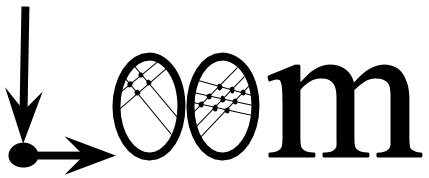Watch the talk on Loom at Clojure/West 2014 and view slides. Also, there's a video of the talk at LispNYC and slides.
loom.graph - records & constructors
loom.alg - algorithms (see also loom.alg-generic)
loom.gen - graph generators
loom.attr - graph attributes
loom.label - graph labels
loom.io - read, write, and view graphs in external formats
loom.derived - derive graphs from existing graphs using maps and filters
Feel free to join Loom mailing list and ask any questions you may have.
Create a graph:
;; Initialize with any of: edges, adacency lists, nodes, other graphs
(def g (graph [1 2] [2 3] {3 [4] 5 [6 7]} 7 8 9))
(def dg (digraph g))
(def wg (weighted-graph {:a {:b 10 :c 20} :c {:d 30} :e {:b 5 :d 5}}))
(def wdg (weighted-digraph [:a :b 10] [:a :c 20] [:c :d 30] [:d :b 10]))
(def rwg (gen-rand (weighted-graph) 10 20 :max-weight 100))
(def fg (fly-graph :successors range :weight (constantly 77)))If you have GraphViz installed, and its binaries are in the path, you can view graphs with loom.io/view:
(view wdg) ;opens image in default image viewerInspect:
(nodes g)
=> #{1 2 3 4 5 6 7 8 9}
(edges wdg)
=> ([:a :c] [:a :b] [:c :d] [:d :b])
(successors g 3)
=> #{2 4}
(predecessors wdg :b)
=> #{:a :d}
(out-degree g 3)
=> 2
(in-degree wdg :b)
=> 2
(weight wg :a :c)
=> 20
(map (juxt graph? directed? weighted?) [g wdg])
=> ([true false false] [true true true])Add/remove items (graphs are immutable, of course, so these return new graphs):
(add-nodes g "foobar" {:name "baz"} [1 2 3])
(add-edges g [10 11] ["foobar" {:name "baz"}])
(add-edges wg [:e :f 40] [:f :g 50]) ;weighted edges
(remove-nodes g 1 2 3)
(remove-edges g [1 2] [2 3])
(subgraph g [5 6 7])Traverse a graph:
(bf-traverse g) ;lazy
=> (9 8 5 6 7 1 2 3 4)
(bf-traverse g 1)
=> (1 2 3 4)
(pre-traverse wdg) ;lazy
=> (:a :b :c :d)
(post-traverse wdg) ;not lazy
=> (:b :d :c :a)
(topsort wdg)
=> (:a :c :d :b)Pathfinding:
(bf-path g 1 4)
=> (1 2 3 4)
(bf-path-bi g 1 4) ;bidirectional, parallel
=> (1 2 3 4)
(dijkstra-path wg :a :d)
=> (:a :b :e :d)
(dijkstra-path-dist wg :a :d)
=> [(:a :b :e :d) 20]Other stuff:
(connected-components g)
=> [[1 2 3 4] [5 6 7] [8] [9]]
(bf-span wg :a)
=> {:c [:d], :b [:e], :a [:b :c]}
(pre-span wg :a)
=> {:a [:b], :b [:e], :e [:d], :d [:c]}
(dijkstra-span wg :a)
=> {:a {:b 10, :c 20}, :b {:e 15}, :e {:d 20}}Attributes on nodes and edges:
(def attr-graph (-> g
(add-attr 1 :label "node 1")
(add-attr 4 :label "node 4")
(add-attr-to-nodes :parity "even" [2 4])
(add-attr-to-edges :label "edge from node 5" [[5 6] [5 7]])))
; Return attribute value on node 1 with key :label
(attr attr-graph 1 :label)
=> "node 1"
; Return attribute value on node 2 with key :parity
(attr attr-graph 2 :parity)
=> "even"
; Getting an attribute that doesn't exist returns nil
(attr attr-graph 3 :label)
=> nil
; Return all attributes for node 4
; Two attributes found
(attrs attr-graph 4)
=> {:parity "even", :label "node 4"}
; Return attribute value for edge between nodes 5 and 6 with key :label
(attr attr-graph 5 6 :label)
=> "edge from node 5"
; Return all attributes for edge between nodes 5 and 7
(attrs attr-graph 5 7)
=> {:label "edge from node 5"}
; Getting an attribute that doesn't exist returns nil
(attrs attr-graph 3 4)
=> nil
; Remove the attribute of node 4 with key :label
(def attr-graph (remove-attr attr-graph 4 :label))
; Return all attributes for node 4
; One attribute found because the other has been removed
(attrs attr-graph 4)
=> {:parity "even"}Derived graphs:
; Build a derived graph using a node mapping
(nodes (mapped-by #(+ 10 %) g))
=> #{11 12 13 14 15 16 17 18 19}
; Subgraphs of g
(edges (nodes-filtered-by #{1 2 3 5} dg))
=> ([1 2] [2 1] [2 3] [3 2])
(edges (subgraph-reachable-from dg 1))
=> ([1 2] [2 1] [2 3] [3 2] [3 4] [4 3])Nothing but Clojure. There is optional support for visualization via GraphViz.
See Loom TODO board.
lein test-allNames in no particular order:
- Justin Kramer
- [Aysylu Greenberg] (https://github.com/aysylu), aysylu [dot] greenberg [at] gmail [dot] com, @aysylu22
- Robert Lachlan, [email protected]
- Stephen Kockentiedt
The dependency graph of Loom's namespaces, generated by lein-ns-dep-graph.
Copyright (C) 2010-2016 Aysylu Greenberg & Justin Kramer ([email protected])
Distributed under the Eclipse Public License, the same as Clojure.



